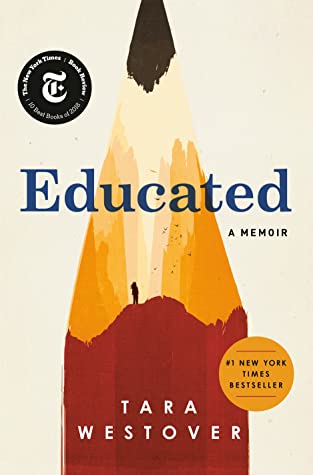Review: Tara Westover’s “Educated”
by Miles Raymer

As the son of two parents with postgraduate degrees, the purpose and value of education were central to my upbringing. My folks never pushed me, but they always encouraged my intellectual growth and facilitated my desire to attend college with eager ease. I always knew I was lucky (they wouldn’t let me forget it), but Tara Westover’s Educated helped me realize just how lucky. This stirring and poignant memoir charts Westover’s remarkable journey from adolescence to adulthood, from ignorance to knowledge, and from captivity to liberation.
Westover grew up in a Mormon family that made their home on a mountain called Buck’s Peak in rural Idaho. Her parents were survivalists––religious zealots who believed civilization would collapse at any moment, leaving the world to become dominated by those who were properly righteous and self-reliant. They demonized and refused to make use of civil institutions such as hospitals, government services, and public schools. Due to these paranoid prejudices, Westover and her siblings were raised without any formal education, and were taught to simply follow the tenets of Mormonism and to distrust the outside world. Westover’s father, a “charismatic gale of a man” who likely suffers from some form of serious mental illness, rules the household with an iron fist, constantly taking uncompromising positions on every imaginable topic and leveraging his talent for religious confabulation to retain control over his wife and children (19).
What follows from this premise is precisely what one would expect from a best-selling memoir. In defiance of her many disadvantages, which include severe physical and emotional abuse from various family members, Westover slowly becomes interested in life beyond Buck’s Peak. An older sibling, Tyler, helps foster her curiosity. “There’s a world out there, Tara,” he says, “and it will look a lot different once Dad is no longer whispering his view of it in your ear” (120). Other experiences conspire to broaden Westover’s perspective, including music, theater, and encounters with less radical extended family and community members.
Through a lot of perseverance and grit, Westover scratches out an ACT score good enough to enroll at Brigham Young University. From that point, her natural academic talent begins to blossom, eventually earning her prestigious positions at both Cambridge and Harvard. But even as her life takes on new and exciting forms, the legacy of her childhood trauma and continued interactions with her toxic family complicate her transition to an informed and reality-based way of living. In one arresting passage, she describes the mental anguish and courage of refusing her father’s final offer to “cleanse” her with his paternal blessing:
The blessing was a mercy…In that moment I knew I could not choose it for myself. Everything I had worked for, all my years of study, had been to purchase for myself this one privilege: to see and experience more truths than those given to me by my father, and to use those truths to construct my own mind. I had to come to believe that the ability to evaluate many ideas, many histories, many points of view, was at the heart of what it means to self-create. If I yielded now, I would lose more than an argument. I would lose custody of my own mind. This was the price I was being asked to pay, I understood that now. What my father wanted to cast from me wasn’t a demon: it was me. (304)
Westover’s process of identity formation is both fascinating and inspiring. “You could call this selfhood many things,” she writes. “Transformation. Metamorphosis. Falsity. Betrayal. I call it an education” (329).
Educated is an exemplary memoir that demonstrates the unique power of the genre to lift our spirits with true rather than imagined narratives. The extraordinary circumstances of Westover’s story map beautifully onto the path taken by all who seek self-betterment through engagement with a wider world than they have previously known.
Rating: 8/10
A enjoyed this memoir and Westover’s interview on Fresh Air. Her mother, LaRee Westover, also wrote a book called Educating.
Interesting and thanks for the comment, Jenny! A quick look at LaRee’s memoir makes it seem like a fairly dishonest and self-deluded attempt to justify herself and her family’s bad behavior. Did you read it, and if so, what did you make of it?
I did read it, against all reviews. As a mother, I was curious about Tara Westover’s mother’s perspective. What stands out is how she rejects reality. She rejects the truth of her daughter’s suffering and her role in it. While she presents herself as an amazing healer, she actually contributed a great deal to her daughter’s pain. I do think it further illuminates Tara Westover’s story, if you can get through it.
Thanks for sharing! That definitely doesn’t sound like something I’d enjoy reading, but I commend you for getting through it and being willing to explore that side of the story. 🙂